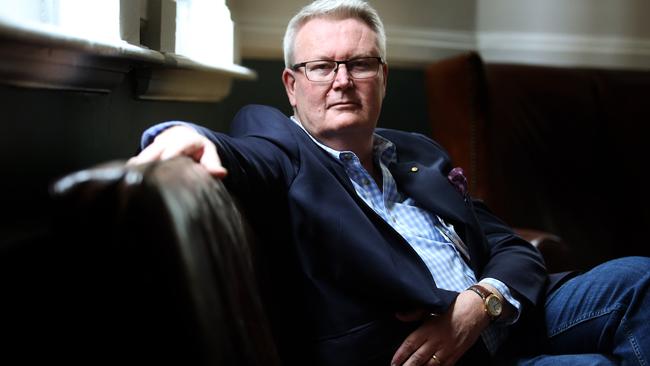Australian Taxation Office calls in ethics doctor Simon Longstaff
The St James Ethics Centre’s Simon Longstaff has been appointed to lead an internal review of the tax office.

With the Australian Taxation Office set to face unprecedented attention due to the forthcoming trial of former assistant deputy commissioner Michael Cranston on two counts of abusing public office, ethics expert Simon Longstaff of the St James Ethics Centre has been appointed to lead an internal review.
Dr Longstaff has worked with a range of leading Australian companies and investors in recent years.
How did you become the tax office’s integrity officer?
The ATO invited me. They have had independent integrity advisers before but they were more concerned with formal compliance and there was a lot of looking at what I call the “hygiene factors”. That’s absolutely essential when looking at questions of personal probity. But (commissioner) Chris Jordan and the ATO wanted to look at other issues that are as important when it comes to integrity. It is about the integrity of the office as a whole, not just individuals. One is that you-are-what-you-say-you-are and you-do-what-you-say-to-do. And you want to ensure the ATO is connected in all its separate bits by one set of ethical values.
What kind of ethical issues does the tax office face?
I’ll give you an example from overseas. People in the ATO have an extraordinary wealth of data about individuals. I know of another country’s tax office where they decided to use that data for their own personal enrichment. They started selling it to commercial interests and, of course, any citizen who would find this out would be outraged. At the time, those people in that tax office didn’t think they had done anything wrong because nothing they were doing was getting in the way of their primary responsibility to collect revenue for the government. Clearly they misunderstood their purpose. So here you’re facing issues of misusing personal data, using public power for private profit. But you also deal with more indirect issues like day-to-day interaction with people whether it is with a citizen or another person in government.
Does a focus on ethics help investment returns?
Yes, absolutely. If your ethics permeate into the culture, you unleash all of the latent capacity of people, you reduce transaction costs, and you drive performance. We’ve known this since 1989 when James Burke, the chief executive of Johnson and Johnson, was celebrated for taking products off the shelf after they were linked to baby poisoning. And he asked if ethics was just about feeling good or does it actually deliver some measurable effect on business returns? He did an assessment on a basket of companies that focused on ethics over 40 years compared with the Dow Jones industrial index. And what he found was the Dow Jones grew on average by about 6.7 per cent per annum. His basket of ethical companies increased by 11.3 per cent on average.
Do you think the financial services royal commission will correct culture within banking?
I think there will be a period of profound embarrassment for people who work in banking and finance and they’ve already been knocked around. Whether they’ll change the culture will depend partly on the boards to have the moral courage to rethink their principles and invest in their ethics and culture as much as they do in compliance.
What are the big ethical issues in the world of family finance?
I think one of the biggest issues is with estate planning. You have an older generation whose children are actually in their 60s and quite self-sufficient so they plan for their grandchildren. Should grandparents be making unilateral financial decisions that affect the children of their children? There are issues around expensive housing, too. So you’re finding a lot of people are looking for more than just technical financial advice about how to structure their portfolio. These are big life questions they are dealing with.
How do we work with an older generation who dominate the property market?
Some families are combining in multi-generational groupings and buying larger properties so they can all live together. So people who can’t afford to live by themselves might get mum and dad to live in a granny flat while they grow their own family. I think taxing the family home is not an appropriate policy response. It gets in the way of families working together to help the next generation.
How do we deal with the issue of deadbeat dads who fail to pay child support?
If you admit you willingly helped to bring a child into the world then there needs to be adequate provision for the child at least until they can be cared for by other means. But if one partner enters a new relationship and the new partner willingly provides for the child and it’s entirely stable, I don’t see the need to impose the harshest possible burden on the missing parent. Though perhaps they should contribute ethically due to their connection with the child. I don’t think there should be a general rule; each case needs individual attention. But whatever happens, it needs to be in the best interest of the child.
What are your investments?
I have general superannuation, a few shares I got from demutualisation in then-NRMA and AMP, and a relatively tiny amount of shares my dad left me in BHP. I’m not a major shareholder in anything apart from through my super fund and I’m not even sure what’s in there.




To join the conversation, please log in. Don't have an account? Register
Join the conversation, you are commenting as Logout